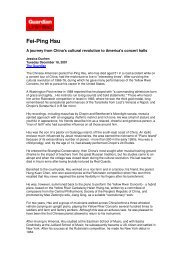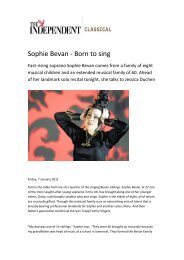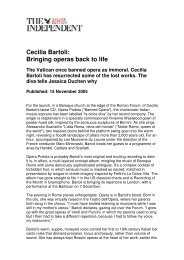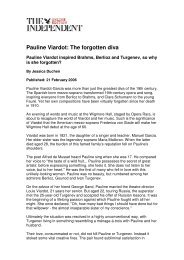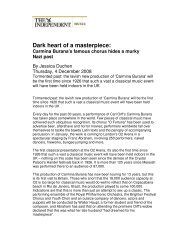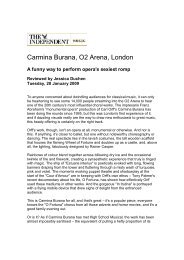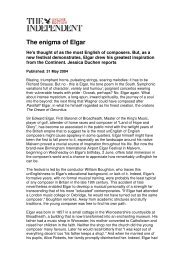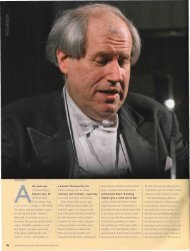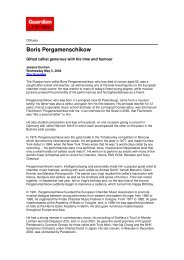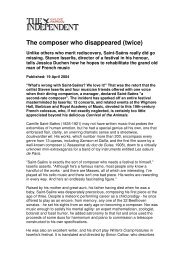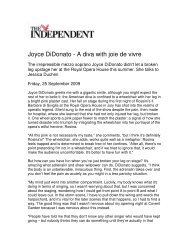ERICH KORNGOLD - Jessica Duchen
ERICH KORNGOLD - Jessica Duchen
ERICH KORNGOLD - Jessica Duchen
Create successful ePaper yourself
Turn your PDF publications into a flip-book with our unique Google optimized e-Paper software.
RADIO<br />
Composer of the Week is broadcast<br />
on BBC Radio 3 weekdays at<br />
12 noon-1pm and repeated at<br />
8.45pm-9.45pm<br />
ATMOSPHERE AND ACTION<br />
Korngold's instinct for portraying<br />
narrative in music, replete with<br />
atmosphere and action, was evident<br />
when he was only 11, writing his<br />
enchanting Don Quixote Character<br />
Pieces for piano. His rhythmic flexibility,<br />
observant eye and gift for capturing<br />
personality paid off in Hollywood.<br />
AMBITION AND CONTROL<br />
Korngold's music can sometimes seem<br />
almost too ambitious for its own good.<br />
He applies dense textures, complex<br />
flights of chromaticism and polytonality<br />
and changes of time signature. The<br />
latter are often part of his eager bid<br />
for control and often amount to<br />
written-out rubatos.<br />
THE MOTIF OF THE<br />
CHEERFUL HEART<br />
As a teenager, Korngold invented a<br />
signature tune for himself which he<br />
named 'The Motif of the Cheerful Heart'.<br />
It is based on two interlocking, rising<br />
fourths and a rising fifth and appears as<br />
early as his Marchenbilder for solo piano<br />
(1910). In 1937, when he scored a turkey<br />
of a movie called Another Dawn, he<br />
transformed the motif with an aching,<br />
homesick tritone instead of the fifth;<br />
the melody, reused to open his Violin<br />
Concerto, is now world famous.<br />
NEVER SHY OF SENTIMENT<br />
While the 20th century reacted against<br />
Romanticism by refuting overt emotion<br />
in music, Korngold's big heart and<br />
generous nature often found him<br />
wearing his heart on both sleeves<br />
at once. His fondness for lyrical,<br />
operetta-like melody sometimes<br />
mingled with his distinctly futuristic<br />
over-ambition to startling effect,<br />
notably in Das Wunder der Heliane.<br />
COMPOSER OF THE MONTH<br />
<strong>ERICH</strong> <strong>KORNGOLD</strong><br />
POST-ROMANTIC<br />
FILM MUSIC PIONEER<br />
As a child prodigy, Korngold looked set<br />
to become one of Austria's most prized<br />
composers, but that was before he crossed<br />
the Atlantic to find success in Hollywood<br />
instead, as <strong>Jessica</strong> <strong>Duchen</strong> explains<br />
Erich Wolfgang Korngold was long<br />
remembered chiefly as the man<br />
who took Mahler's lush style to<br />
the cinema. He was one of the principal<br />
composers who, during the 1930s and<br />
'40s, made film music an integral part<br />
of a movie, replete with the techniques<br />
of the great German Romantics. But<br />
there was far more to Korngold - as<br />
proved by a tremendous recent surge<br />
of interest in his concert works and<br />
operas, culminating in occasions from<br />
London to Australia this year to mark<br />
the 50th anniversary of his death.<br />
Korngold's life story reads rather<br />
like a filmscript itself. First, it falls<br />
into a neatthree-act scenario, each<br />
involving a compelling setting:<br />
turn-of-the-century Vienna, the<br />
Golden Age of Hollywood and the<br />
arid disappointments of post-war<br />
Europe and America. Next, conflict<br />
abounds, with two world wars, the<br />
antagonism between Korngold and<br />
his impossible father, and Korngold's<br />
inner conflicts as he grew from child<br />
prodigy phenomenon to controversial<br />
superstar and thence to depressive,<br />
overweight exile. Add Korngold's<br />
rapid-firing wit, instinct for musical<br />
timing, long love story with his wife,<br />
Luzi, and a supporting cast that<br />
included Mahler, Strauss, Maria Jeritza<br />
and Errol Flynn, and the stage is set,<br />
the cameras ready to roll.<br />
46 BBC MUSIC M A G A Z I N E NOVEMBER 2007<br />
Korngold was born in Brno in 1897,<br />
theyoungersonof Julius Korngold, an<br />
eminent music critic who had been<br />
helped into his first post by Brahms.<br />
When Erich was four, Julius became<br />
second-in-command to Eduard<br />
Hanslick at the Neue Freie Presse and<br />
moved his family to Vienna. As snaketongued<br />
in print as his boss, whose job<br />
he later inherited-thus becoming the<br />
most powerful music critic in the city<br />
-Julius shared Hanslick's conservative<br />
outlook. Mesmerised by Mahler, snide<br />
about Strauss and utterly outraged by<br />
the Second Viennese School, his antiprogressive<br />
stance would hobble his<br />
gifted son for the rest of his life.<br />
By the time Erich was ten, his talent<br />
was so evident that Julius took him<br />
to play to Mahler. On the great man's<br />
advice, Korngold became the pupil of<br />
Zemlinsky who could hardly believe<br />
the flair with which his young charge<br />
completed his Schauspiel Overture,<br />
premiered when he was only 14. His<br />
ballet-pantomime DerSchneemann<br />
(The Snowman), which Zemlinsky<br />
orchestrated, had already been<br />
performed at the Vienna Hofoper and<br />
musicians such as the Arthurs Nikisch<br />
and Schnabel were gladly taking on his<br />
works. Influences on Korngold ranged<br />
from Mahlerto Puccini and Stravinsky.<br />
Interestingly, at first his music was<br />
distinctly in touch with its times.
COMPOSER OF THE MONTH <strong>KORNGOLD</strong><br />
music<br />
DOWNLOAD CLUB<br />
Join the BBC Music Download Club today at<br />
www. bbcmusicmagazine. com, claim your free<br />
35 downloads, and enjoy our exclusive monthly<br />
playlist of music featured in Composer of the<br />
Month. This issue, until 21 Nov, download<br />
some of Korngold's film and orchestral music.<br />
His first full-length stage work,<br />
Die tote Stadt, could only have come<br />
from the Viennese melting pot of<br />
late Romanticism and burgeoning<br />
Expressionism. Premiered in 1920,<br />
it was based on a violent novella by<br />
the Belgian Symbolist poet Georges<br />
Rodenbach, Bruges-la-Morte, and the<br />
opera's extended dream sequence and<br />
final catharsis -the inventions of the<br />
librettist 'Paul Schott', a pseudonym<br />
for Julius and Erich working together<br />
- betray awareness of Freud. The opera<br />
was widely performed in the interwar<br />
years: its atmosphere of doomed<br />
nostalgia matched the Zeitgeist.<br />
Korngold's next and most ambitious<br />
opera, Das Wunder der Heliane, was<br />
the work he always regarded as his<br />
greatest. Dedicated to his bride, Luzi,<br />
whom he married after a long, fraught<br />
courtship hampered by his father's<br />
disapproval, it's a heady extravaganza<br />
celebrating the transcendental power<br />
of love, mingling the futurism of Lang's<br />
Metropolis with the Romantic excesses<br />
of Wagner's'Liebestod'. Heliane was<br />
its composer's greatest hope, but<br />
became his greatest tragedy, largely<br />
because of his father. Ernst Krenek's<br />
Jonny spielt auf- a jazzy fantasy opera<br />
about a black violinist-was scheduled<br />
for premiere at the same time, autumn<br />
1927, threatening to make Heliane look<br />
outdated. Julius promptly wrote the<br />
kind of tirades against Jonny that could<br />
only produce the opposite effect.Jonny<br />
sold out; Heliane bore the backlash.<br />
In the tough economic climate<br />
of the late 1920s, Korngold had a<br />
young family to feed. To his father's<br />
disappointment, he took a job at the<br />
Theater an der Wien, arranging and<br />
conducting operettas - he revered<br />
BBC MUSIC MAGAZINE NOVEMBER 2007 47
Johann Strauss as much as Richard.<br />
Through this, he met the great director<br />
Max Reinhardt, who became one of<br />
his closest friends. With the rise of the<br />
Nazis in Germany, the Jewish Korngold<br />
ran into problems: his music was<br />
banned there after Hitler took power<br />
in 1933, and his German publishers<br />
were evasive about his opera, Die<br />
Kathrin, which originally concerned a<br />
romance between a German girl and<br />
a French soldier (Korngold attempted<br />
to skirt the awkwardness by making<br />
Kathrin Swiss). In 1933, Reinhardt left<br />
for America; the followingyear, making<br />
a film of Shakespeare's A Midsummer<br />
Night's Dream for Warner Brothers, he<br />
invited Korngold to join him to arrange<br />
Mendelssohn's music for the project.<br />
Korngold's unerring instinct forthe<br />
relationship of time, sound and vision<br />
made him the perfect film composer.<br />
Offered unprecedented privileges<br />
by Jack Warner, head of the studio,<br />
Korngold commuted between Europe<br />
and Hollywood until the Anschluss<br />
(Union) of March 1938,<br />
when he was fortuitously<br />
in America composing the<br />
score for The Adventures<br />
of Robin Hood. He<br />
brought hisfamily to<br />
safety-including Julius -<br />
but is said to have vowed<br />
to compose no more<br />
serious music until Hitler<br />
had been defeated.<br />
At first, Korngold<br />
was idealistic about<br />
films, treating them<br />
as if they were operas<br />
and envisaging a day<br />
when entire operas would be written<br />
specially for the screen. He won Oscars<br />
for Anthony Adverse (1936) and The<br />
Adventures of Robin Hood (1938). But<br />
in time, as the novelty wore off and<br />
the moralising Hayes Commission<br />
wrecked plotline after plotline, the<br />
quality of the films Korngold was<br />
assigned began to decline. His fellow<br />
immigrant Max Steiner, who scored<br />
SAILING TO SAFETY:<br />
Korngold arrives in<br />
New York with his<br />
family in 1936<br />
COMPOSER OF THE MONTH <strong>KORNGOLD</strong><br />
King Kong and Gone With<br />
the Wind among others,<br />
remarked: 'Erich, since<br />
you came to Hollywood,<br />
your music has got worse<br />
and mine has got better.<br />
How do you account<br />
for that?' 'That's easy,'<br />
quipped Korngold: 'you've<br />
been stealing from me<br />
and I've been stealing<br />
from you!' In 1949, after<br />
recovering from a heart<br />
attack, Korngold returned<br />
to Vienna for the first<br />
time. 'When I first came<br />
to Hollywood, I couldn't understand<br />
the dialogue. Now I can,' he told an<br />
Americanjournalist.<br />
Julius died in 1945. He had never<br />
ceased berating his son for abandoning<br />
high art and, in a piece of typically<br />
questionable advice, he had pointed<br />
out that when Korngold's films<br />
vanished, so did the music; perhaps<br />
Korngold should recycle the best
of those scores in concert works.<br />
Korngold obeyed. His Violin Concerto,<br />
premiered by Jascha Heifetz in 1947,<br />
was based on music from Another<br />
Dawn, The Prince and the Pauper and<br />
others; his Symphony in F sharp, his<br />
last major work, also drew on film<br />
scores, notably The Private Lives of<br />
Elizabeth and Essex. But critics were<br />
disgusted bythe idea of bringing<br />
Hollywood to the concert hall. One<br />
of them just had to say, 'More corn<br />
than gold'-a preconception that has<br />
dogged his reputation ever since.<br />
Nor did Korngold encounter<br />
much joy in Vienna, which proved<br />
a catalogue of disappointments.<br />
Promised performances never<br />
materialised; old acquaintances<br />
greeted him with comments like,<br />
'Ah, you're back. When are you<br />
leaving?' While he continued to write<br />
in his own style with his own voice, the<br />
world around him had changed beyond<br />
recognition. Korngold, guilty only of<br />
being true to himself, died of a brain<br />
haemorrhage- and, perhaps, grief<br />
- back in Hollywood, aged only 60.<br />
Today, film music is regarded as an<br />
art and Korngold has proved ripe for<br />
reassessment. With a flood of new<br />
recordings and a major celebration at<br />
the Southbank Centre this autumn,<br />
The Adventures of Erich Wolfgang<br />
Korngold is setto continue. •<br />
The London Philharmonic Orchestra<br />
performs works by Korngold at<br />
London's Royal Festival Hall on<br />
2,14 and 21 November<br />
RADIO<br />
Radio 3 s Composer of<br />
the Week programme<br />
is broadcast at 12 noon<br />
Monday to Friday and then repeated<br />
at 8.45pm each day.<br />
November's Composers of the Week are:<br />
5-9 November Purcell's Contemporaries<br />
12-16 November Ireland<br />
19-23 November Rameau<br />
26-30 November Korngold and Rozsa<br />
<strong>KORNGOLD</strong><br />
RECOMMENDED DISCS<br />
DIE TOTE STADT<br />
Carole Neblett (Marietta), Rene Kollo (Paul),<br />
Hermann Prey (Franz/Pierrot); Munich Radio<br />
Symphony Orchestra/Erich Leinsdorf<br />
RCA Cold Seal CD 87767 £17.99<br />
A feast of melody, fantasy and high emotion.<br />
VIOLIN CONCERTO<br />
Jascha Heifetz (violin)<br />
RCA Gold Seal 09026 61752-2 £9.99<br />
Authenticity from the violinist who premiered<br />
this robust and deeply felt concerto.<br />
DAS WUNDER DER HELIANE<br />
Anna Tomowa-Sintow (Heliane), John David<br />
de Haan (Stranger), Berlin Radio Symphony<br />
Orchestra/John Mauceri.<br />
Decca 475 8271 £22.99<br />
The only complete disc of this magnum opus.<br />
<strong>ERICH</strong> WOLFGANG <strong>KORNGOLD</strong>:<br />
ADVENTURES OF A WUNDERKIND (DVD)<br />
Directed by Barrie Gavin<br />
Arthaus Musik 100362 £18.99<br />
Superb documentary introduction to Korngold.<br />
• To order these discs see page 96<br />
11957



